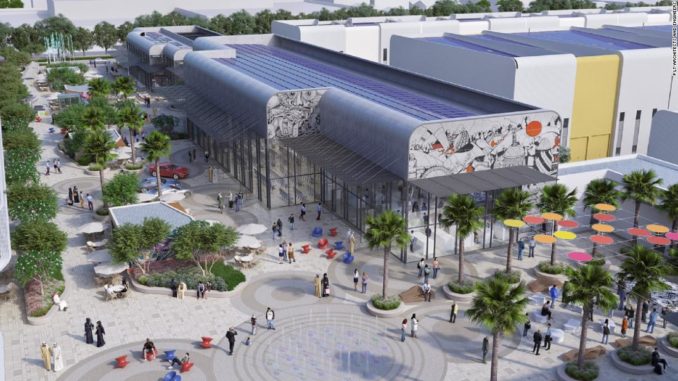
At 2.1 million square feet, the new “city” is approximately the size of Grand Central Station in New York, and is split into three clusters: business, logistics, and social.
The business cluster will accommodate 12 office buildings that promise modern facilities and sustainable design for companies of varying size.
Agreements have been struck with companies to occupy the new premises but they cannot yet be named, the developers say. The most popular products among retailers are clothing, jewelry, and electronics.
“Commercity” tenants will pay no income or corporation tax, and will benefit from a “one-stop shop” of support services including for immigration, healthcare, administration, and banking.
Clients will also be able to make use of the logistics cluster, consisting of heavily automated AI-powered warehouses, and a social cluster of restaurants and cafes.
The first buildings are expected to be opened and occupied in November, with staged openings until the project is completed in 2023.
The site plan includes a social cluster with restaurants and cafes.
Growth potential
The developers of “Commercity” are confident that investment in e-commerce will pay off as the market could be set for explosive growth.
E-commerce in the Middle East is projected to be worth $48.6 billion in 2022, up from $26.9 billion in 2018, with the UAE and Saudi Arabia the main drivers of growth, according to a report from industry and market analysis company BMI research.
According to DAFZA’s own research, e-commerce in the MENASA region (Middle East, North Africa, Southeast Asia) was growing at an annual rate of 24.6% to 2020.
Bullish predictions are largely justified, says Mehrnoush Shafiei, an analyst at research group Euromonitor. But the sector is growing from a low base.
“A major beauty retailer in the UAE with probably the best developed online shopping portal says that only 1% of sales come from online, the rest is from stores,” says Shafiei.
The country is “primed for digitization,” the analyst says. “The technology is there, the state support is there, and the people are ready for it.”
Progress has been limited by a lack of space for businesses to store their stock, she adds, as well as slow deliveries. If the new free zone can address these issues, the rewards could be significant.
“If ‘Commercity’ can help facilitate transactions to increase speed and efficiency, then for sure I would expect skyrocket growth,” says Shafiei.

Leave a Reply